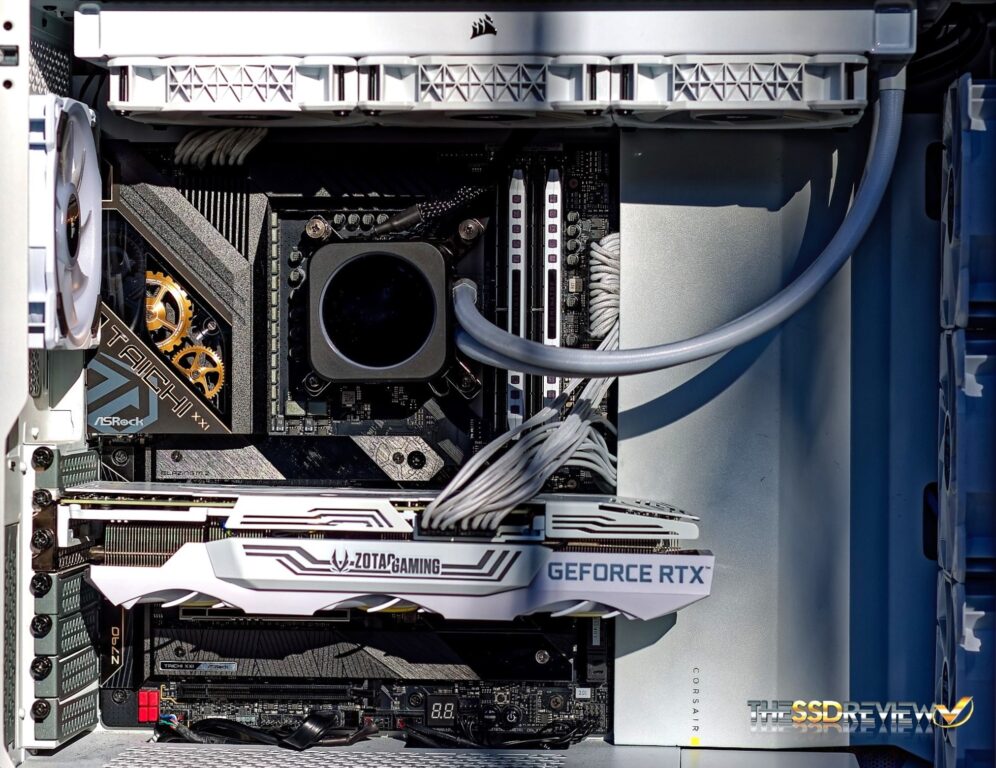TSSDR TEST BENCH AND PROTOCOL
SSD testing at TSSDR differs slightly, depending on whether we are looking at consumer or enterprise storage media. For our Crucial T705 Gen 5 2TB SSD testing today, our goal is to test in a system that has been optimized with our SSD Optimization Guide.
For this Test Bench, there are no ‘bios’ specific performance tweaks whatsoever and our new ASROCK Z790 Taichi brought Test Bench us to over 5GHz while the 32GB Corsair Dominator Platinum DDR5 memory settled in at 5600MHz.
The components of this Test Bench are detailed in the title link below. All hardware is linked for purchase and product sales may be reached by a simple click on the individual item.
ASROCK Z790 TAICHI PCIE 5.0 TEST BENCH COMPONENTS
Our ASRock Z790 Taichi PCIe 5.0 Test Bench was built and reported on earlier this year and clicking the title will take you to that link. We chose to test with this system, rather than our ASUS Z790 Test Bench as the ASRock Taichi was the only to have a 100% completely functional PCIE 5.0 M.2 slot incorporated into the motherboard at the time. The ASUS Z790 Test Bench came with a Rog Hyper M.2 Card Adapter which had to be situated into a PCIe slot and caused bifurcation issues at the best of times when combined with the GFX card and a system Gen4 SSD. Links to component purchase can be found within the report highlighted above.
BENCHMARK SOFTWARE
The software in use for today’s analysis is typical of many of our reviews and consists of Crystal Disk Info, ATTO Disk Benchmark, Crystal Disk Mark, AS SSD, Anvil’s Storage Utilities, AJA, TxBench, PCMark 10, 3DMark, PassMark Performance Test, Final Fantasy XIV Gaming BenchMark, as well as true data testing. Our selection of software allows each to build on the last and to provide validation to results already obtained.
A WORD ABOUT PERFORMANCE AND BUILDS
As can be seen above, we have just upgraded from a 12th Gen Intel Z690 Alder Lake system to a 13th Gen Z790 Raptor Lake build where we saw the chipset move comfortably into PCIe 5.0. This alone may cause a performance increase in testing which we will identify in our comparison charts until there are enough Gen 5 reviews to move them to their own chart. Our view is simply that we want to provide the reader with the best possible performance and we welcome all to refer back to specific reports in order to identify the system in use should they desire. Logically, we simply haven’t the time to retest hundreds of SSDs every time we move up to a new platform. Thank you for understanding.
CRYSTAL DISK INFO VER. 8.17.7 X64
Crystal Disk Info is a great tool for displaying the characteristics and health of storage devices. It displays everything from temperatures, the number of hours the device has been powered, and even to the extent of informing you of the firmware of the device.
Crystal DiskInfo validates that our SSD is running in PCIe 5.0 x4, using the NVMe 2.0 protocol and confirms that it is TRIM capable. The temperature shown above is a bit high because we pushed it to such. If you look at the below ATTO at the bottom two data sizes of 48MB and 64MB, this is where that temperature was taken and we can see that thermal throttling is just about to kick in. Don’t let this concern you. Although this SSD runs just a bit warm, it takes some work to push it into submission as we do.
ATTO Disk Benchmark is perhaps one of the oldest benchmarks going and is definitely the main staple for manufacturer performance specifications. ATTO uses RAW or compressible data and, for our benchmarks, we use a set length of 256mb and test both the read and write performance of various transfer sizes ranging from 0.5 to 8192kb. Manufacturers prefer this method of testing as it deals with raw (compressible) data rather than random (includes incompressible data) which, although more realistic, results in lower performance results.
ATTO performance hits highs of 13.22GB/s read and 11.48GB/s write are the best we have seen to date for this software when testing a M.2 SSD.
 The SSD Review The Worlds Dedicated SSD Education and Review Resource |
The SSD Review The Worlds Dedicated SSD Education and Review Resource | 

